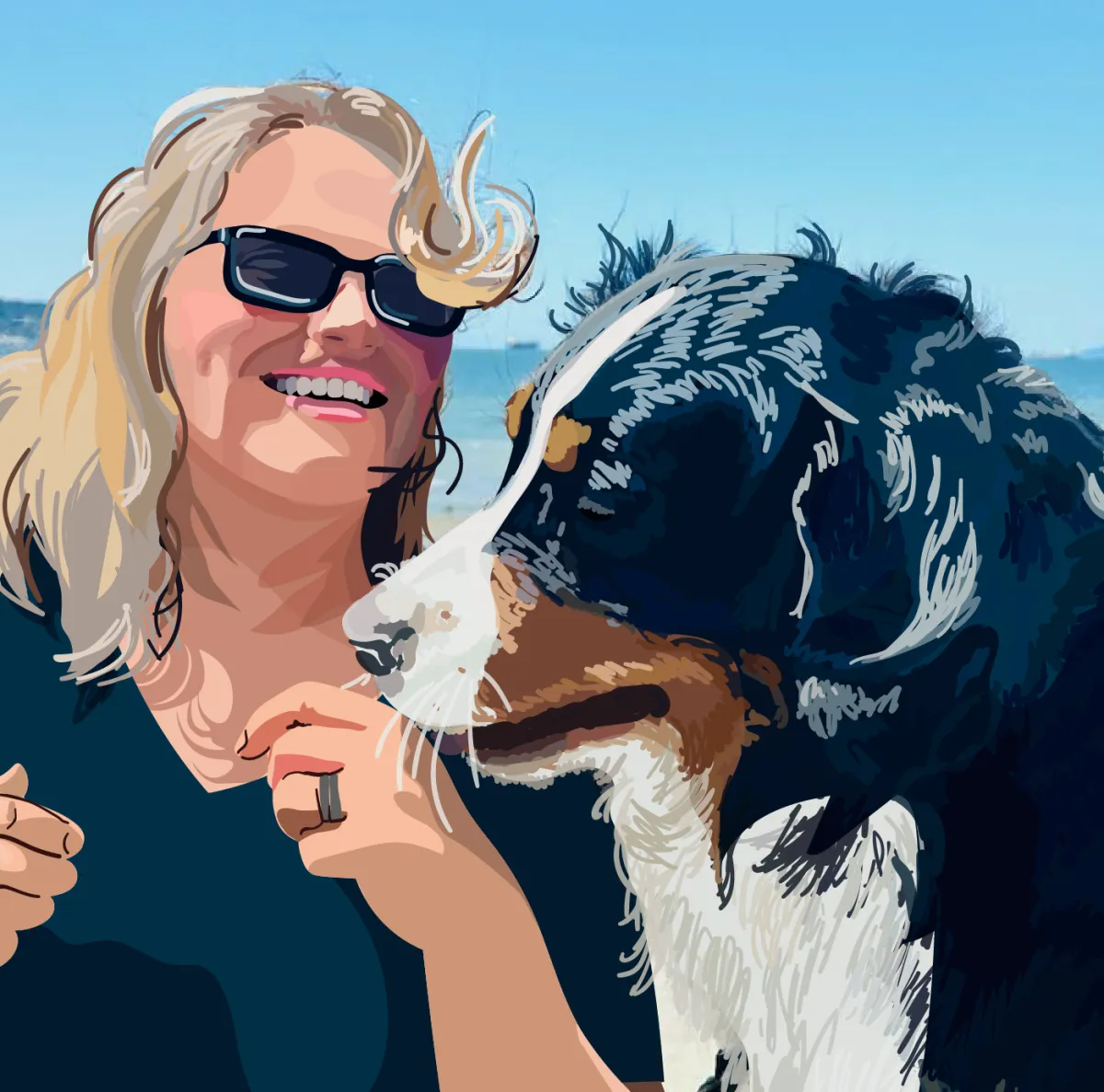

About Us
Since 2011, we’ve combined formal education in psychology, veterinary care, and canine cognition to provide exceptional dog training.
Dedicated to the humane and ethical treatment of our best friends, we rely on the latest research, while ensuring that our work is rooted in 15,000 years of human-dog connection.
Dogs and humans have evolved together for 20,000 years. They have found food for us, and protected our families and livestock. They have gone to war with us and acted as gentle playmates for our children. They have laid down their lives to save us.
Our lifestyles have changed a lot in the last century, but our need for dogs hasn't. A dog and their owner, when reunited, sync their heart rates within minutes. Just owning a dog decreases heart attack mortality by 30%.
We are designed to live with dogs, but we need to learn how to incorporate them into our chaotic modern lives.
We're here to help you and your dog learn how to live together in these modern times.
Forget sit and stay!
At Wag The Dog we can teach dogs to:
Find our phones and keys when we lose them.
Find our children when we lose them!
Put recycling in the blue bin.
Fetch their own leash for walks.
Close doors and cupboards.
Imitate our actions.
Communicate their needs and thoughts clearly.
Recognize fragile people like children and the elderly and be cautious around them.
Accompany us on outings and errands.
Trust us to return home to them when we go out.
Understand simple phrases and two step instructions.

Carol Millman (she/her)
- Lower Mainland
B.Sc, Psychology, Veterinary Technologist, Certified Pet Dog Trainer - Knowledge Assessed (2022), Certified Trick Dog Instructor
Carol lives in Port Coquitlam and works in the Lower Mainland. Her autism gives her a unique perspective which she brings to her work with both dogs and people. Her time working as a veterinary nurse culminated in becoming the Director of Medical Services at a holistic veterinary clinic.
In 2008, Carol was hired as an apprentice Advanced Instructor at Pacific Assistance Dogs Society (PADS). She trained and placed wheelchair assistance dogs, hearing dogs for the Deaf, and facility therapy dogs. She also ran puppy classes and assisted in the daily care of the dogs in training.
Carol is now the Director of Training at Heeling Assistants Canada, and still helps pet dogs through Wag The Dog.

- Currently On Leave -
Amelia Kellum (she/her) - Fraser Valley
B.Sc Canine Studies, Certified Professional Dog Trainer Knowledge/Skills Assessed (2022), Certified Trick Dog Instructor.
Amelia is a certified professional dog trainer with nearly two decades of experience training dogs - including hunting, acting, and assistance dogs such as hearing, therapy, guide, and mobility dogs.
Amelia has learned directly from Bonnie Bergin, pioneer of the disability assistance dog, and is also a graduate of the Ben Kersen and the Wonderdogs professional trainer's program.
She apprenticed at PADS as an instructor and has been training independently since 2010. She now lives in Hope with her family.
What can you achieve
with our help?
Come check out our blog!

The Unpleasant Truth About Good Dogs
Dog Trainers Don't Want To Admit It, But...
... Good Dogs Are Born. Not Trained.
If anyone out there has faith in the power of behavior change, it is the dog trainer. Our entire career, and often our entire education, has been centered around the science and psychology of change.
Unfortunately, this sometimes leads to inadequate education in the power of DNA.
It is this lack of education that then leads dog trainers to blame the dog's owners... or to simply prevent them from blaming themselves... when a dog is misbehaving.
I'm exaggerating, of course. There are many things that dog trainers do recognize as being genetically driven when it comes to dog behaviour:
Rare is the dog trainer who will blame the owner when the dog is barking at strangers passing on the street, chasing squirrels, or hiding bones in the couch cushions. We make a living out of explaining patiently to owners that DOGS ARE DOGS and will do these things.
We also understand the genetics of dog breeds more than the general public do. We explain to dog owners that their beagles don't come when called because beagles are genetically designed to never give up on a smell. Their loud and penetrating barks are designed to tell us where they are so we can follow them. Dog trainers know this and explain it to beagle owners routinely.
Huskies are one of the only dog breeds that cannot digest grains because unlike dogs in every other part of the world, they come from a culture where no one grew and ate grains, but ate an almost exclusively carnivorous diet.
Dog trainers know these things and get paid to tell them to people who bought dogs they didn't know enough about.
So, why do I say that we don't understand the power of genetics?
Because we have been miseducated into believing that all behavior has an environmental factor and can therefore be changed.
It's a problem because the general public also believe this.
If someone has a well behaved child, we assume they are a great parent. If someone has a well behaved dog, we assume they did something right in raising that dog. Makes sense does't it?
Except that scientifically... that's just not true.
Human Twin Studies Have Shown The Power of The Gene
Studies of human identical twins raised apart have given us a truly depression look at the power of the genetic code.
Whether raised by messy parents or neat freaks, twins end up with the same level of tidiness in adulthood. The twin raised by messy parents attributes it to the slovenly surroundings growing up. They say, "I had to learn to clean up because my parents wouldn't do it!" while the other twin attributes their neatness to their type-A parents "I could tidy up almost before I could walk!"
They both attribute it to environment... yet their environments were totally different. The result was the way their genetic programming reacted to those environments... it wasn't really the parenting at all.
This goes far beyond neatness to many aspects of identical twins... they often end up in the same jobs, sometimes married to women of the same name with dogs of the same breed who also have the same name.
Funnily enough, when raised apart twins tend to end up far more similar to each other than when raised together.
What Does This Have To Do With Dogs?
The fact is that if you get the right dog, you may never need to call a dog trainer.
But if you are unlucky and bring home a dog with different genetics, you may need to spend hundreds or even thousands on paying an expert in behaviour change to help you and the dog manage.
We don't want to believe this.
By "we" I mean both the general public and dog trainers ourselves.
Dog trainers don't want to believe that we wouldn't really be necessary - if only dogs were bred more carefully.
Oh, we'd still be needed when people wanted to teach their dog how to fetch them a beer from the fridge. But we wouldn't be needed for our bread-and-butter: fixing dogs with behavior problems.
The Truth Is That Some Dogs Cannot Be Ruined
I have met dogs who grew up in appalling conditions. I have met dogs who were beaten, starved, burned... I once met a dog who spent so much time in the crate that when he was rescued, the bylaw officers had to use the jaws of life to cut him out of it, because he could no longer fit through the door.
Some of these dogs have PTSD, fear of people, obsession with stealing food. All completely understandable given their past!
But some of those dogs... don't?
The dog that was cut out of the crate should - by all sense and logic - be terrified of the outside world. But I met him at the dog park where he romped happily with other dogs and ran right up to everyone who walked onto the field.
The dog who was found rail-thing and starving on the streets should hoard food and steal it at every opportunity. But I know one who turns up his nose at all but the most bougie treats once he was back to a healthy weight.
No, I'm Not Saying That Experiences Don't Matter
Of course experiences matter. A dog can't learn something they haven't been taught. If you want your dog to sit for a cookie or stop at cross walks, you're going to have to teach them. And obviously a dog raised chained to a peg in the back yard is not going to be able to fetch you the newspaper as soon as you bring them into the house.
A bad environment or experience can absolutely create bad behaviour... temporarily.
I know a dog who came to his current owner with broken teeth, a terror of brooms, and aggression towards men. But once he felt secure and loved, his aggression disappeared. Even when his beloved new owner was being berated by an emotionally disturbed man in a public setting, he sat quietly at her side.
I have watched a dog who was thoroughly downtrodden by prong collars and leash corrections bloom into a bouncy and mischievous pup after a couple of months of flat collar and treats.
Cases like this trick us into thinking that we can fix dogs who have been broken - we can change things for the better!
But the truth is... I have also met dogs who had a lifelong fear of brooms after one fell near them in the kitchen in puppy hood. Despite treats. Despite training. One bad experience = lifelong phobia.
Now, some dog trainers get around this by pointing out that dogs go through sensitive periods where a bad experience can make a deep and lasting impression. This is 100% true. If a broom fell on a dog during one of those stages, it might very well never be completely forgotten.
However, it is also true that some dogs develop lifelong phobias from one bad experience... even if it wasn't during a sensitive fear period. It is also true that the degree to which dogs recover from bad experiences during a sensitive period varies wildly from dog to dog.
Genetics Can Be 100% Responsible While Environment Is Also 100% Responsible
If my claim above sounds crazy, consider the example of the human genetic disorder PKU (I won't attempt to spell the full name).
PKU is a genetic disorder which results in too much of the amino acid Phenylalanine building up in the blood. If you don't have PKU, you never have to think about phenylalanine.
This disorder is 100% genetic. We know the genes involved. In Canada and many other countries, all newborns are tested for it on the day they are born, even though it is very rare.
Here is why: If you have PKU, and steps aren't taken immediately to limit this amino acid in your diet, you will start having seizures by a few months old. You'll have behaviour problems, intellectual disability, and psychiatric problems. It's a big deal, and it's irreversible once the damage is done.
But if you are put on a low phenylalanine diet... chances are very good that you will grow up completely normally and live a relatively normal life. Normal intellect, normal health... maybe some eczema... that's it.
So, even though PKU is 100% genetic, it is also 100% reliant on environment when it comes to how you act and behave in adulthood.
As geneticists say: DNA loads the gun and the environment fires it.
My point is that the world is full of happy and well behaved dogs who could have been aggressive or reactive if they had not been carefully raised from puppyhood.
And the world is full of reactive and aggressive dogs who could have been happy and normal if they had been born and raised in a better environment.
But we should not mistake that to mean that this is always the case. Nor should we assume that just because a coworker is living a happy and normal life that they do not have PKU. A careful diet doesn't fix or change PKU. It just prevents the negative effects.
In the same way, raising a puppy well and carefully from birth can help prevent negative effects that otherwise absolutely would have happened because they are in that dog's DNA.
But all it takes is a bad experience or for something to go wrong, and that pesky problem WILL show up, despite all of the owner's hard work.
So, Really, Genetics Are 100% Responsible Full Stop
The world is full of dogs who were raised by owners who did... questionable things... in raising them. They were raised in a barn, not socialized to strangers, and were choked when they didn't sit fast enough. But they're still... fine?
They greet people happily, they love their family, and after they die their photo is cherished on the mantlepiece for decades afterwards.
The dog did well because, well, the dog was genetically good: resilient, cheerful, affectionate, open to new people and experiences, and not particularly prone to aggression or reactivity.
Now the same family, convinced that they are Master Dog Owners, go and get another puppy. Maybe even the same breed. They carefully copy their original tactics because it turned out such a great dog. But this dog is... different. This dog growls when they take away forbidden objects, and turns sullen when it is choked into sitting. It barks at their visitors.
So they call a trainer, and the trainer points out all of the things they did wrong: They didn't socialize the puppy. They didn't use positive reinforcement training. They scolded and alpha-rolled the pup when it stole shoes. They created this aggressive dog.
But the family will ignore this trainer, because they know this is nonsense - they did the same stuff with their previous dog who turned out wonderfully.
So they go to another trainer who tells them that this dog is just stubborn and dominant, and that they need to go harder - choke more, alpha roll more, and don't give up!
Sometimes this works. The dog gives up, because while there was more fight in this dog than in the last one, there wasn't a lot of fight in him really.
Sometimes it backfires. This dog has a LOT of fight in him, and he ends up biting someone and being put down.
So... who was right?
Everyone in this scenario is right... but also wrong.
The first trainer was right that the methods the family was using are proven to backfire on a lot of dogs. The method the positive trainer uses are the ones proven to produce the most good results and work well with the vast majority of dogs.
The positive trainer's methods are preventative.
Since there is no "good dog" gene, we can't test them at birth like we do with babies for PKU. So we set the dog up for success with good socialization - in case the puppy is genetically shy - and positive reinforcement - in case the dog is prone to biting people who choke it.
The second trainer was right that this dog's base temperament was more suspicious and defensive than their first dog, and needed different tactics. However, that trainer's methods are also based on the fact that dogs are domesticated and bred to put up with all kinds of abuse.
Use those tactics on a wild animal, which hasn't been selectively bred to tolerate choking or scolding, and it will not work.
Positive trainer tactics are the same used in zoos on tigers, and in aquariums on orcas. They are tactics that work well with a wide range of genetic temperaments.
Good Training Manages Genetics But Can't Change Them.
No trainer can make a tiger stop being a tiger, or an orca stop being an orca. Terrible incidents with both species have taught us that. The hubris of thinking that training enacts real change invites disaster.
What we can do is help manage problems, ideally before they show up, while minimizing possible blow-back. In a world where there was no PKU test, we would need to either limit every child's intake of phenylalanine... or accept that some babies will develop seizures and cognitive deficits.
Since the average dog - like the average person - has a mix of good traits with a few questionable ones, we aim to set them up for success and raise them as solidly as we can.
When problems arise, we aim to manage the root cause - the way their genetics interact with the world, and teaching them a different reaction.
So if you're struggling with your dog, remember: it isn't your fault! It isn't even your dog's fault. They didn't pick their own genes any more than you picked yours. That family habit of nail biting... that genetic tedency toward bowel cancer that motivates you to watch your diet... you didn't choose that.
The only one who could be blamed for "choosing" your dogs genes is the breeder... if the dog was even deliberately bred at all. Even then, breeding is not an exact science. Mutations and flukes happen.

Call a positive dog trainer, but don't let them blame you for your dog, and remember: we can change their behaviour. Not their genes.
If the training stops... the behavior will come back.

We work on land which was taken from the nations who had lived here for thousands of years. They are still here and they are still waiting patiently for us to stop being jerks about it.
© 2024 Copyright Wag The Dog Training
All Rights Reserved




